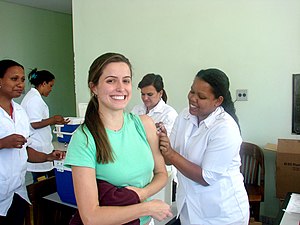 Image via Wikipedia
Image via WikipediaMost of us grew up with the needle and those periodic torture sessions at the local doctor's office. Since the controversy surrounding immunizations grew heated, no one has been unable to escape the hostility surrounding the subject. This year's addition of new vaccine requirements have heated it all up again, particularly in the special ed. community.
Indiana's Exemptions
Indiana has two kinds of exemptions- religious or medical. Parents have to update these exemption letters yearly with their child's school. A medical exemption requires a doctor to sign off on it. That's pretty rare. Even when contraindications are clear on packaging and manufacturers paperwork, a doctor is typically loathe to sign off on an exemption. Of course, there are doctor's who will, occasionally. Religious exemptions do not require proof, however, they do require the parent list each vaccine exempted, state a firmly held belief, and update them yearly with the school.
Herd Immunity
Herein lies the debate. Vaccine-injured families say the risk outweighs the benefit. No one denies the probablity of vaccine injury, even the vaccine creators, but many experts worry about the public risk if many more opt out of the vaccine schedule. Herd immunity is when diseases don't strike individuals who are not immune to them because most in a society are immune, usually through vaccination. Experts frequently worry that an outbreak of any given "eradicated" disease is one international flight away.
Vaccine Injury
Vaccine mandate opponents are not one simple group, but rather a large coalescence of different types of groups who believe, or know, that vaccine played a part in the injury of someone they loved. The most notable of these involved the Mumps, Measles, Rubella shot, commonly called MMR. It contained a mercury-based preservative called thimerasol that many believed unnecessary. The makers of vaccines did finally give in to the public outcry and remove the ingredient from most vaccines, leaving only influenza containing thimerasol. Recently, the Center for Disease Control sponsored a study finding thimerasol was not the cause of autism in children. Autism isn't the only potential injury, parents say.
Severe fevers, seizures, and rash, among many other possible symptoms, can result from vaccines. While immunizations are tested like any other drug, there are many reports of injury reported each year. This is done through the Vaccine Adverse Event Reporting System or VAERS.
So what's more important? Doctors typically answer, "the greater good", while parents have another more personal answer. They want to protect their child. Society's difficulty isn't deciding who's right or wrong in the debate. What we have to determine is who is most right? Even when that's done, someone may still lose.
Indiana's Exemptions
Indiana has two kinds of exemptions- religious or medical. Parents have to update these exemption letters yearly with their child's school. A medical exemption requires a doctor to sign off on it. That's pretty rare. Even when contraindications are clear on packaging and manufacturers paperwork, a doctor is typically loathe to sign off on an exemption. Of course, there are doctor's who will, occasionally. Religious exemptions do not require proof, however, they do require the parent list each vaccine exempted, state a firmly held belief, and update them yearly with the school.
Herd Immunity
Herein lies the debate. Vaccine-injured families say the risk outweighs the benefit. No one denies the probablity of vaccine injury, even the vaccine creators, but many experts worry about the public risk if many more opt out of the vaccine schedule. Herd immunity is when diseases don't strike individuals who are not immune to them because most in a society are immune, usually through vaccination. Experts frequently worry that an outbreak of any given "eradicated" disease is one international flight away.
Vaccine Injury
Vaccine mandate opponents are not one simple group, but rather a large coalescence of different types of groups who believe, or know, that vaccine played a part in the injury of someone they loved. The most notable of these involved the Mumps, Measles, Rubella shot, commonly called MMR. It contained a mercury-based preservative called thimerasol that many believed unnecessary. The makers of vaccines did finally give in to the public outcry and remove the ingredient from most vaccines, leaving only influenza containing thimerasol. Recently, the Center for Disease Control sponsored a study finding thimerasol was not the cause of autism in children. Autism isn't the only potential injury, parents say.
Severe fevers, seizures, and rash, among many other possible symptoms, can result from vaccines. While immunizations are tested like any other drug, there are many reports of injury reported each year. This is done through the Vaccine Adverse Event Reporting System or VAERS.
So what's more important? Doctors typically answer, "the greater good", while parents have another more personal answer. They want to protect their child. Society's difficulty isn't deciding who's right or wrong in the debate. What we have to determine is who is most right? Even when that's done, someone may still lose.

No comments:
Post a Comment